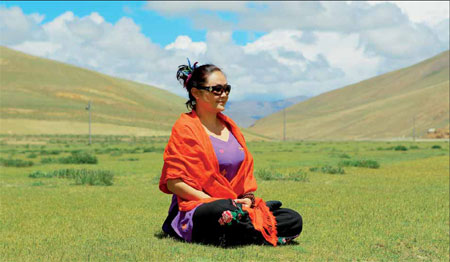Burnt out workers seek a higher plain for relief
Updated: 2012-09-20 13:34
By Li Aoxue and Lu Chang (China Daily)
|
|||||||||||
|
Yang Lihong, founder of Shen Xin Ling counseling group, heads all the way to Xigaze, Tibet autonomous region, to meditate. Provided to China Daily |
Different forms of therapies growing in popularity among professionals
Xu Zhen, a 29-year-old white-collar worker, recently found a new way to find relief at work.
Through a meditation class provided by Shen Xin Ling counseling group (which provides classes on astrology, music therapy and hypnosis) in Hangzhou, Zhejiang province, Xu says she's discovered an entirely different way of relieving stress that's a lot more fun than catching a movie, doing yoga and traveling.
"I meet some people who suffer from the same stress of work. We therefore can talk and communicate," Xu says. "We are surrounded by mountains, water and there are teachers mentoring us on meditation."
Xu is just one of an increasing number of people who are giving psychotherapy a try in China. More and more Chinese executives are suffering from high amounts of stress. Many of them have now turned to psychotherapy as a new form of release.
Yang Lihong, founder of the Shen Xin Ling counseling group, says those who seek out psychotherapy are white-collared workers, university students and entrepreneurs who are just not happy.
Among white-collar workers who are undergoing psychotherapy treatment, 50 percent of them have lived overseas.
"These groups of people (returning from overseas) tend to pay more attention to psychological health as they consider it very important for their personal development," Yang says.
Yang set up the counseling group, China's first organization providing psychotherapy, back in 2009 when she met Terry Hu, a famous psychotherapist from Taiwan.
Born in 1953, Hu is also one of Taiwan's most popular actress over the last century.
"Originally psychotherapy is from Western countries such as the United States. It became popular in Taiwan in the 1980s, but on the Chinese mainland, it is still quite new and not known by many people," says Yang, who is also a psychotherapist.
Since opening in 2009, the number of people seeking psychotherapy at Shen Xin Ling has apparently increased by 20 percent per year. The group already attracts a following of about 4,000 practitioners.
In 2012, Yang moved her office from Beijing to East Tianmu mountain in Hangzhou, Zhejiang province, to expand the office.
Liu Xia, a 50-year-old white-collar worker who participated in a meditation event in Qinghai last September, says psychotherapy is a healthy way of life for urbanites.
"We spent most of the time in our offices, and we deal with mobile phones and computers every day. It is therefore necessary for us to take a rest in nature," says Liu, a manager who works at an energy company in Beijing.
Liu says that once she became an office manager, she became accustomed to leading others. She also had a tendency of failing to listen to others. But after she started to meditate, she re-learned how to listen to others.
Yang says there are more women than men who take psychotherapy at Shen Xin Ling because women are more likely to express their feelings and to open their hearts. Yang also found that there is an increasing number of young people who are finding out about psychotherapy.
As Chinese society continues to fall in love with material wealth, more young people are tending to feel uneasily with their lives.
Xia Fang, an aromatherapy specialist for more than 10 years, says aromatherapy, which is one type of psychotherapy, is also enjoying a small level of popularity among many Chinese women in recent years.
"A lot of women executives come to us for aromatherapy during their lunch break because they know it will make them be in a better condition during their meetings in the afternoon," Xia says.
Xia opened Summa Spa Institute in Beijing in 2003 after receiving training in Hong Kong and finding a partner from Singapore. After an initial customer base of 50 to 60 people a year, in 2008, the number of customers rose to 800.
In 2005, Summa Spa Institute became a member of the International Spa Association and provided courses on aromatherapy to people who want to become professionals in the field.
Still, Xia says the aromatherapy market in China is underdeveloped.
"Most aroma therapists in China have not taken specialized training. ... Aroma therapists have not been recognized as a formal profession here, but in developed countries such as the UK, aroma therapists need to have a background in medicine," Xia says.
"Aromatherapy is a required service at every five-star hotel, and it is more developed in Hong Kong and Singapore, but it will take some time for the Chinese mainland to be well developed in this field," Xia says.
People who come for aromatherapy are usually female executives and housewives who are affluent.
"Most women who are successful in their career tend to have a failure in their marriage and relationship (as they pay too much attention on their career). They come here for aromatherapy as the therapy balances their mind and body and provides a comfortable relief," Xia says.
She believes aromatherapists play an important role because they act like a matchmaker between clients and what treatment they want.
"We are not going to accept too many clients per day because we need to make sure that our therapists are not overworked," Xia says.
Her plan is to expand her business into other cities such as Shanghai and Wuhan, first trying to make train more aromatherapists in other cities and then providing treatment in these cities.
Contact the writers at liaoxue@chinadaily.com.cn and lvchang@chinadaily.com.cn
(China Daily 09/20/2012 page15)












